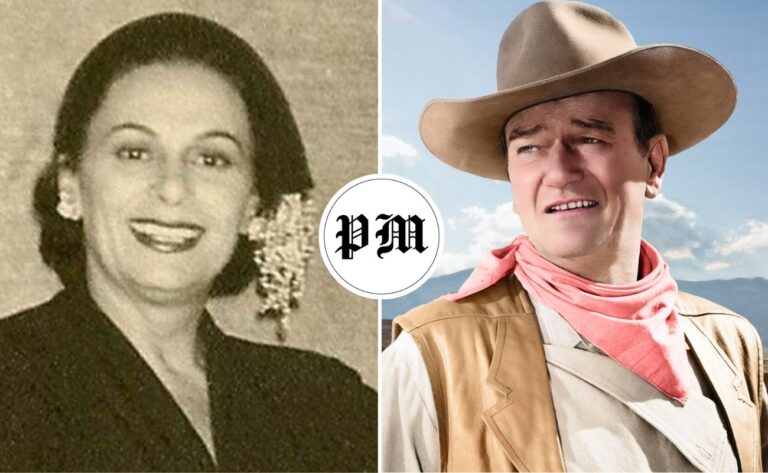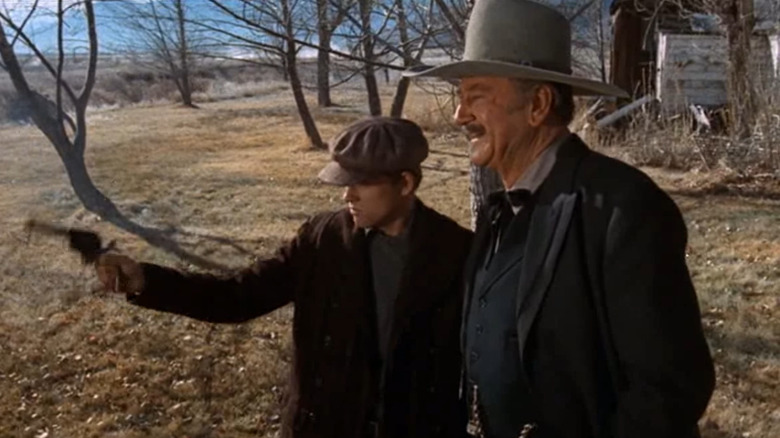Josephine Alicia Saenz, a name etched into Hollywood’s silent backdrop, may not have starred in films or sought the limelight, but she played a pivotal role in the life of one of America’s greatest Western film legends—John Wayne. As his first wife and the mother of four of his children, Josephine was a steadfast presence during his early career struggles and evolving fame. Her story offers insight into a different side of the Duke—his family life, vulnerabilities, and relationships.
Quick Bio Table Josephine Alicia Saenz
| Attribute | Details |
|---|---|
| Full Name | Josephine Alicia Saenz |
| Known For | First wife of John Wayne |
| Birth Year | 1908 |
| Place of Birth | Los Angeles, California, USA |
| Ethnicity | Latina (Cuban and Spanish descent) |
| Religion | Devout Roman Catholic |
| Spouse | John Wayne (m. 1933–1945) |
| Children | Four (Michael, Mary Antonia, Patrick, Melinda) |
| Notable Relation | Connected to U.S. Consul in Panama |
| Marriage Duration | 12 years |
| Death | 2003, aged 95 |
| Legacy | Mother of prominent Wayne descendants |
Early Life and Heritage
Born in 1908 in Los Angeles, Josephine came from a deeply religious and prestigious background. Her father was Dr. José Saenz, a Panamanian diplomat and physician who served as a consul. The family upheld strong Roman Catholic traditions and believed in cultivating disciplined, conservative values.
Her Latina roots, combined with a dignified upbringing, shaped her into a woman of elegance and strong moral beliefs. This foundation would later become both a bridge and barrier in her relationship with the rough-edged, Protestant-raised John Wayne.
A Fateful Encounter with John Wayne
Josephine and Marion Robert Morrison (John Wayne’s birth name) met in the late 1920s. At the time, Wayne was a struggling University of Southern California (USC) football player with aspirations in film. Their paths crossed at a social event, and what began as a charming connection blossomed into a romance that faced serious resistance.
Josephine’s family initially opposed the relationship, citing Wayne’s Protestant background and unstable career path. But Wayne’s persistence, coupled with Josephine’s quiet defiance, eventually led to their marriage.
Marriage in the Midst of Aspiration
After years of courtship and familial pressure, John Wayne and Josephine Alicia Saenz married on June 24, 1933. Their union was celebrated in a lavish Catholic ceremony—a significant gesture from Wayne, who converted to Catholicism to satisfy Josephine’s family and religious expectations.
This marriage coincided with Wayne’s climb in Hollywood. Though still considered a B-list actor, his role in “The Big Trail” (1930) had set the groundwork for future stardom.
Life as a Hollywood Wife
Josephine maintained a low public profile, often avoiding Hollywood’s glamorous parties and press. She focused on raising their children and maintaining a devout, family-centered lifestyle.
Despite being married to an actor, she remained distant from the industry’s whirlwind. While Wayne’s image evolved into a rugged Western hero, Josephine kept the family rooted in faith and tradition. However, the mismatch between Wayne’s fame-driven lifestyle and Josephine’s conservative values started to create friction.
The Children They Raised
Josephine and John Wayne had four children:
-
Michael Wayne (1934–2003): A film producer who managed many of his father’s business affairs.
-
Mary Antonia “Toni” Wayne LaCava (1936–2000): Had a private life, with brief appearances in film.
-
Patrick Wayne (b. 1939): Followed in his father’s footsteps and starred in over 40 films.
-
Melinda Wayne Munoz (1940–2022): Occasionally involved in public events honoring her father.
Josephine’s commitment to her children was profound. She ensured their Catholic education and provided emotional stability despite the increasing strains in the marriage.
Cracks in the Marriage: Fame and Differences
As John Wayne’s fame skyrocketed in the late 1930s and 1940s, his Hollywood persona began to conflict with Josephine’s private values. He was often away on location shoots, became involved in various relationships, and began indulging in a more liberal lifestyle.
Josephine’s deeply religious and disciplined demeanor contrasted sharply with Wayne’s growing reputation as a rugged, womanizing actor. These differences, combined with time apart and infidelity, slowly eroded the foundation of their relationship.
The Final Separation and Divorce
By 1943, the couple had already become emotionally distant. Their divorce was finalized in 1945, ending a 12-year marriage. The separation was not scandalous by Hollywood standards but still marked a pivotal moment in both of their lives.
Interestingly, despite the end of their romantic relationship, Wayne continued to respect Josephine for being a devoted mother and his early supporter. He often credited her for maintaining the home while he chased stardom.
Life After Divorce: A Private Strength
Unlike many Hollywood ex-spouses, Josephine did not remarry or exploit her connection to fame. She chose a quiet, dignified life, focusing on her children, faith, and community involvement.
She became a matriarch figure in the extended Wayne family, offering guidance and support. Her presence was especially strong in the lives of her children, especially Michael and Patrick, who later became involved in film and foundation work honoring John Wayne.
Her Relationship with John Wayne Post-Divorce
Although divorced, Josephine and John Wayne maintained cordial relations. They co-parented their children and sometimes appeared at family events together. Wayne reportedly admired Josephine’s grace and discretion throughout his life.
She even remained connected to the John Wayne Cancer Foundation, especially after her son Michael played a key role in establishing it following John Wayne’s death in 1979.
Religious and Cultural Influence
Josephine’s Catholic roots had a long-lasting impact not only on her children but on Wayne himself. While he did not practice Catholicism strictly during his Hollywood years, he converted to Catholicism shortly before his death—a decision that many believe was influenced by Josephine’s unwavering faith.
Her cultural heritage also brought a rich blend of Latin traditions into the Wayne household, giving their children a dual identity that shaped their worldview.
Death and Enduring Legacy
Josephine Alicia Saenz passed away in 2003 at the age of 95, having outlived John Wayne by 24 years. Her life is remembered as one of dignity, strength, and quiet resilience.
Today, she is often recognized not only as Wayne’s first wife but also as the woman who stood by him when he was just “Marion” the dreamer—not yet the Duke of Hollywood.
Her Role in John Wayne’s Life and Legend
Josephine represented stability and tradition in Wayne’s life—a contrast to his later high-profile relationships. Their union, while imperfect, helped ground Wayne in his early years and gave him a family that remained central to his legacy.
Her influence lived on through their children, particularly Patrick and Michael, who helped maintain the Wayne brand and philanthropic outreach in later years.
Conclusion
While Hollywood spotlighted John Wayne as a cinematic icon, Josephine Alicia Saenz remained the woman who supported him behind the scenes. Her legacy is etched not in film credits but in the foundations she built as a wife, mother, and moral compass. Her life story adds a human dimension to the legend of John Wayne—reminding us that behind every star, there often lies the influence of someone quieter, yet equally powerful.
FAQs
Q1: How long were Josephine Alicia Saenz and John Wayne married?
A1: They were married for 12 years, from 1933 to 1945.
Q2: How many children did Josephine have with John Wayne?
A2: They had four children: Michael, Toni, Patrick, and Melinda.
Q3: Was Josephine Alicia Saenz involved in Hollywood?
A3: No, she chose to live a private, religious life and remained outside of the Hollywood spotlight.
Q4: Did Josephine remarry after divorcing John Wayne?
A4: No, she remained single and dedicated her life to her family and faith.
Q5: What religion did Josephine Alicia Saenz follow?
A5: She was a devout Roman Catholic, and her faith played a significant role in her life and marriage.




